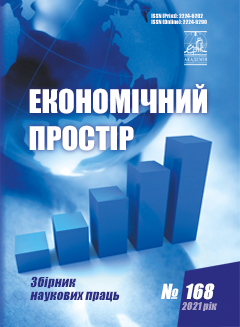FINANCING PUBLIC GOODS UNDER THE INFLUENCE OF CHANGING THE POLITICAL ELITE
Abstract
The purpose of the article is to conduct a retrospective analysis of the volume and structure of financing of public goods in accordance with the change of the political elite in Ukraine (changes of the Presidents of Ukraine).The research methodology consists in calculating the dynamics of the expenditure part of the consolidated budget of Ukraine in terms of functional classification of expenditures, the share of the main items of the consolidated budget expenditure for 1992-2020, the share of the expenditure part of the consolidated budget of Ukraine and the main expenditure items in GDP. According to the results of the study, the dynamics of changes in the total volume and structure of financing public expenditures in accordance with the change of the political elite is revealed. The practical significance of the analysis indicates that the system of expenditure of the consolidated budget of Ukraine, respectively, the structure of financing public goods, is imperfect and needs to be adjusted. Thus, the largest share of expenditures of the consolidated budget of Ukraine, which has recently been decreasing from year to year, is spent on financing social protection and social security. The volume of expenditures on economic activity, which is able to give impetus to the development of the state economy, is insufficient. Expenditures on education and healthcare in Ukraine have been significantly reduced. Due to these budgetary resources, the financing of national functions by the state, financing of public order, security and the judiciary has been increased. Imperfection of fiscal policy, unreasonable financing of certain areas, insufficient control over the implementation of budget programs, their inefficiency and many other problems lead to irrational use of funds from the budgets of Ukraine. Therefore, in order to establish stability in the economic sphere of the state, it is necessary to restrain the growth of the share of consolidated budget expenditures relative to GDP. This will reduce the tax burden on the population and business, reduce the state budget deficit of Ukraine. When allocating expenditures, it is necessary to start from the size of the revenue side of the budget in order to achieve proportional growth of revenues and expenditures. It is worth paying attention to ensuring reliable control over the movement of budget resources. In order to increase the degree of satisfaction of the needs of the population in public goods, it is necessary to develop the political consciousness and political culture of citizens, to increase the level of financial decentralization in the country.
References
Алєксєєнко Д.Д. Локальні суспільні блага: сутність та класифікація. Економічний простір. 2019. № 143. С. 5–18.
Волохова І.С. Місцеві фінанси та перспективи поглиблення фінансової децентралізації в Україні : монографія. Одеса : Атлант, 2014. 462 с.
Горбанев В.С. К вопросу о категориальной оформленности феномена общественных благ. Економічний вісник Національного гірничого університету. 2016. № 2. С. 18–27.
Журавльова Ю.О. Суспільні блага як чинник людського розвитку : монографія. Харків : Видавництво Іванченка І.С., 2019. 284 с.
Кічурчак М.В. Відтворення суспільних благ в економічній системі України: концептуальні засади теорії та практики : монографія. Львів : ЛНУ імені Івана Франка, 2016. 494 с.
Модернізація суспільного сектору економіки в умовах глобальних змін : монографія / за ред. А.Ф. Мельник. Тернопіль : Екон. думка, 2009. 528 с.
Пилипенко Г.М., Горбаньов В.С. Глобальні блага у структурі благ суспільного призначення. Вісник соціально-економічних досліджень. 2018. № 2. С. 19–30.
Радіонов Ю.Д. Теоретичні основи суспільних благ в економічній системі держави. Економіка та держава. 2017. № 2. С. 22–27.
Сучасний стан, проблеми та перспективи розвитку фінансової системи України : монографія / І.С. Волохова та ін. ; за ред. д-ра екон. наук І.С. Волохової. Харків : Видавництво Іванченка І.С., 2021. 395 с.
Тулай О.І. Державні фінанси і суспільні блага: погляд у контексті сталого людського розвитку. Економічний вісник Запорізької державної інженерної академії. 2017. Вип. 6–2(12). C. 103–108.
Alyeksyeyenko D.D. Lokalni suspilni blaga: sutnist ta klasifikaciya: Ekonomichnij prostir, 2019. №143. S.5-18.
Volohova I.S. Miscevi finansi ta perspektivi pogliblennya finansovoyi decentralizaciyi v Ukrayini: monografiya. Odesa: Atlant, 2014. 462 s.
Gorbanev V.S. K voprosu o kategorialnoj oformlennosti fenomena obshestvennyh blag: Ekonomichnij visnik Nacionalnogo girnichogo universitetu, 2016. №2. S.18–27.
Zhuravlova Yu.O. Suspilni blaga yak chinnik lyudskogo rozvitku: monografiya. Harkiv: vidavnictvo Ivanchenka I.S., 2019. 284 s.
Kichurchak M.V. Vidtvorennya suspilnih blag v ekonomichnij sistemi Ukrayini: konceptualni zasadi teoriyi ta praktiki : monografiya. Lviv: Vidav. centr LNU imeni Ivana Franka, 2016. 494 s.
Modernizaciya suspilnogo sektoru ekonomiki v umovah globalnih zmin : monografiya za red. A.F. Melnik. Ternopil: Ekon. dumka TNEU, 2009. 528 s.
Pilipenko G.M., Gorbanov V.S. Globalni blaga u strukturi blag suspilnogo priznachennya: Visnik socialno-ekonomichnih doslidzhen, 2018. №2 S.19 –30.
Radionov Yu.D. Teoretichni osnovi suspilnih blag v ekonomichnij sistemi derzhavi: Ekonomika ta derzhava, 2017.№2. S. 22 – 27.
Suchasnij stan, problemi ta perspektivi rozvitku finansovoyi sistemi Ukrayini: monografiya. /Volohova I.S., Homutenko A.V. ta in.; za red. d-ra ekon. nauk I.S. Volohovoyi. H.: Vidavnictvo Ivanchenka I.S., 2021. – 395 s.
Tulaj O.I. Derzhavni finansi i suspilni blaga: poglyad u konteksti stalogo lyudskogo rozvitku: Ekonomichnij visnik Zaporizkoyi derzhavnoyi inzhenernoyi akademiyi / red. O.V. Kovalenko. Zaporizhzhya, 2017. Vip. 6-2 (12). S. 103 – 108.



